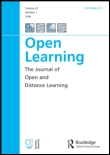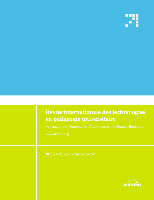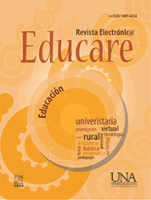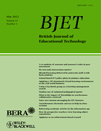
Contemporary Educational Technology
Scope & Guideline
Connecting Research and Practice in Educational Technology
Introduction
Aims and Scopes
- Technology Integration in Education:
The journal emphasizes the integration of various technologies in educational practices, exploring how these tools can enhance student engagement, motivation, and learning outcomes. - Innovative Pedagogical Approaches:
It highlights the development and evaluation of new pedagogical strategies, particularly those that leverage technology to create more effective learning environments. - Research and Evaluation of Educational Technologies:
The journal publishes studies that assess the efficacy of digital tools and educational technologies, providing evidence-based insights into their impact on teaching and learning. - Focus on Specific Educational Contexts:
Contemporary Educational Technology addresses technology use in diverse educational settings, including K-12 education, higher education, and professional training, ensuring a broad applicability of findings. - Emerging Technologies and Trends:
The journal explores the implications of emerging technologies, such as artificial intelligence and augmented reality, on educational practices, fostering a forward-thinking approach to educational technology.
Trending and Emerging
- Artificial Intelligence in Education:
There is a growing focus on the role of AI, particularly tools like ChatGPT, in enhancing learning experiences, supporting student engagement, and automating educational tasks. - Gamification and Game-Based Learning:
Increasingly, research is exploring the effectiveness of gamification strategies and game-based learning environments in improving student motivation and learning outcomes. - Distance and Online Learning Innovations:
The COVID-19 pandemic has led to a surge in studies addressing online and distance learning, focusing on best practices, student experiences, and the efficacy of various delivery methods. - Digital Literacy and Competencies:
Emerging themes include the assessment and development of digital literacy skills among students and educators, highlighting the need for competencies that align with technological advancements. - Collaborative Learning and Social Presence:
Recent studies emphasize the importance of social presence and collaborative learning in online environments, indicating a trend towards fostering community and interaction in digital learning contexts.
Declining or Waning
- Traditional Learning Methods:
There is a noticeable decline in research focused on traditional, non-technology-based teaching methods, as the emphasis shifts towards innovative, technology-enhanced pedagogies. - Generalized Technology Usage:
Studies that broadly discuss technology usage without specific context or application are becoming less common, with a trend towards more targeted investigations that assess specific technologies or pedagogical frameworks. - Single-Technology Studies:
Research focusing solely on one technology (e.g., only mobile apps) without a broader pedagogical context or comparative analysis is declining, as the field moves towards integrated approaches that consider multiple technologies and their interactions.
Similar Journals

Open Learning
Empowering Educators with Cutting-Edge ResearchOpen Learning, published by Routledge Journals, Taylor & Francis Ltd, is a leading peer-reviewed journal in the field of education and e-learning, showcasing innovative research and practice since its inception in 1970. With a robust impact factor and consistently ranked in the Q1 category for both education and e-learning by Scopus, this esteemed journal positions itself at the forefront of academic dialogue, exploring the evolving landscape of digital and open learning environments. The journal's authoritative content and empirical studies serve as essential resources for researchers, educators, and students striving to enhance pedagogical strategies and educational outcomes in a rapidly changing technological world. Published quarterly, Open Learning remains committed to cultivating scholarly exchange and advancing knowledge within the global education community.

Journal of Computers in Education
Advancing Knowledge at the Intersection of Tech and Teaching.The Journal of Computers in Education is a distinguished academic journal published by SPRINGER HEIDELBERG, dedicated to advancing the intersection of technology and pedagogy. With an ISSN of 2197-9987, this journal has established itself as a pivotal resource for researchers and educators alike since its inception in 2019, maintaining a strong focus on innovative applications of computer science within educational contexts. Ranked in the Q1 category in both Computer Science Applications and Education, the journal demonstrates a high impact in its field, holding a remarkable position within the top 1.5% of journals in social sciences (rank #20/1543) and top 5.5% in computer science applications (rank #45/817). The journal's scope encompasses a wide range of topics including but not limited to educational technologies, e-learning methodologies, and the effective integration of computers in teaching, making it an essential source for professionals and students who are keen to explore cutting-edge research and trends. Although access options vary, the journal's commitment to disseminating quality research continues to enrich the academic landscape in Germany and beyond, nurturing the synergies between education and technology.

Educar
Championing Open Access for Global KnowledgeEducar, published by the Universitat Autònoma de Barcelona, stands as a significant contributor to the fields of education, communication, and human-computer interaction. With an Open Access policy since 1982, this journal provides an invaluable platform for the dissemination of innovative research and insightful perspectives from diverse academic backgrounds. The journal boasts a commendable position in the 2023 category quartiles, ranking Q2 in Communication and Q3 in both Education and Human-Computer Interaction, which underscores its relevance and influence within these disciplines. Educar is indexed in Scopus and reflects a strong reception in the academic community, with its Social Sciences - Communication category ranked 173rd out of 511 journals, affirming its 66th percentile standing. Researchers and professionals will find this journal particularly useful for accessing a wide range of studies that not only push the boundaries of knowledge but also offer practical insights that enhance educational practices and technological engagement.

Journal of E-Learning and Knowledge Society
Navigating the Evolving Landscape of Digital EducationJournal of E-Learning and Knowledge Society is a premier academic journal dedicated to the exploration and advancement of e-learning and knowledge dissemination in contemporary society. Published by the SOC ITALIANA E-LEARNING, this journal has established itself as a vital resource for researchers and practitioners since its inception in 2006. With an open access model adopted in 2007, the journal promotes the free exchange of ideas and research findings, ensuring wide accessibility to academic contributions in this rapidly evolving field. The journal is indexed in notable databases and holds a Q3 classification in both Computer Science Applications and Education, reflecting its significant role in the advancement of educational technologies. Furthermore, its Scopus ranks highlight its relevance within the educational and computer science communities. Based in Rome, Italy, the Journal of E-Learning and Knowledge Society aims to bridge the gap between theory and practice, providing a platform for innovative research that shapes the future of digital learning environments. Whether you are a researcher, educator, or student, this journal offers valuable insights and developments in e-learning that are critical to navigating today’s knowledge society.

Computers and Education Open
Fostering collaboration in educational innovation.Computers and Education Open is a pioneering open access journal published by Elsevier that focuses on advancing the field of educational technology and digital learning methodologies. Since its inception in 2020, the journal has provided a platform for researchers, educators, and practitioners to disseminate innovative findings and share insights related to the integration of computing technologies in educational settings. With its ISSN 2666-5573, this journal aims to bridge the gap between technology and education, fostering a collaborative environment for those dedicated to enhancing learning experiences through computational tools. Leveraging the rigorous standards of Elsevier's publishing excellence, Computers and Education Open attracts high-quality research that influences pedagogical practices and educational policies globally. The open access nature of the journal ensures that valuable knowledge is freely accessible, making it an essential resource for academics and professionals looking to stay at the forefront of educational advancements.

Sodobna Pedagogika-Journal of Contemporary Educational Studies
Transforming educational landscapes with cutting-edge research.Sodobna Pedagogika - Journal of Contemporary Educational Studies is a vital publication dedicated to advancing the field of education through contemporary research and scholarly discussions. Published by the Slovenian Association of Educationalists, this journal serves as a platform for educators, researchers, and practitioners to explore innovative educational practices and theories. With a Q4 status in Education and currently ranked #1182 out of 1543 within its category by Scopus, it strives to disseminate quality research that addresses the challenges and dynamics of modern educational contexts. Operating out of Slovenia, the journal emphasizes open dialogue and the exchange of ideas among diverse educational stakeholders, fostering an inclusive environment for learning and growth. As an important resource for those involved in educational studies, it plays a crucial role in tackling pressing issues and enhancing pedagogical practices from 2015 to 2024 and beyond.

Education in the Knowledge Society
Elevating educational discourse through open access research.Education in the Knowledge Society is a prominent open-access journal published by EDICIONES UNIV SALAMANCA, aimed at advancing research and discourse within the fields of Education and Computer Science, particularly in their intersection. With an ISSN of 2444-8729, this journal has been dedicated to disseminating scholarly work since its establishment in 2015, providing free access to invaluable content that enhances the global conversation around educational practices in the digital era. The journal has earned a strong reputation, evidenced by its impressive Scopus rankings—#55 out of 1406 in the Social Sciences _ Education category, placing it in the 96th percentile, and #129 out of 747 in Computer Science _ Computer Science Applications, in the 82nd percentile. While its coverage in Scopus has reached a temporary halt, the journal continues to serve as an essential resource for researchers, professionals, and students who seek to explore the evolving dynamics of knowledge acquisition and dissemination in today's society. The journal's commitment to fostering innovative educational frameworks underlines its significance in shaping future scholarly investigations and practical implementations.

International Journal of Technologies in Higher Education
Advancing Learning with Innovative Tech SolutionsInternational Journal of Technologies in Higher Education, with ISSN 1708-7570 and E-ISSN 1708-7570, is a distinguished academic platform dedicated to advancing the intersection of technology and pedagogy in higher education. Published by INT JOURNAL TECHNOLOGIES HIGHER EDUCATION, this open-access journal has been at the forefront of educational innovation since 2004, providing researchers, practitioners, and students access to high-quality research without financial barriers. The journal aims to disseminate cutting-edge studies, best practices, and theoretical insights that explore the transformative impact of emerging technologies in the field of education. Situated in Montreal, Canada, the journal serves as a pivotal resource for those committed to enhancing learning environments through technological advancements. By fostering scholarly discussion and collaboration, the International Journal of Technologies in Higher Education plays an essential role in shaping the future of educational practices globally.

Revista Electronica Educare
Exploring Innovative Pedagogies for a Global Audience.Revista Electronica Educare, published by UNIV NACL, CIDE in Costa Rica, stands as a vital resource in the field of education, contributing significantly to the discourse since its inception in 2001. As an Open Access journal, it promotes the dissemination of educational research globally, ensuring that valuable findings are accessible to a wider audience without financial barriers. With an increasing impact factor reflected in its current categorization in the Q3 quartile for education sciences and a Scopus rank of #989 among 1543 in Social Sciences, the journal is recognized for its quality and relevance in contemporary educational studies. The journal covers a broad spectrum of topics within the educational landscape until 2024, making it an essential platform for researchers, professionals, and students eager to explore innovative pedagogical practices and share their insights with the academic community. As it continues to evolve and flourish, Revista Electronica Educare invites contributors and readers alike to engage with the cutting-edge of educational research.

BRITISH JOURNAL OF EDUCATIONAL TECHNOLOGY
Enhancing Learning Experiences with Technology-Driven SolutionsBRITISH JOURNAL OF EDUCATIONAL TECHNOLOGY, published by Wiley, is a leading journal in the field of educational technology, recognized for its commitment to advancing research and practice in this dynamic arena. With an impressive impact factor that places it in the Q1 quartile for both Education and E-learning in 2023, it serves as a critical resource for academics, practitioners, and policymakers alike. This journal, with an established publication history since 1970, focuses on the integration of technology in educational settings, aiming to disseminate innovative findings and facilitate discussions that enhance learning experiences. Researchers contributing to the journal address diverse topics from digital learning environments to the pedagogical implications of emerging technologies, ensuring comprehensive coverage of the latest trends and methodologies. Submissions are welcomed in various formats, promoting collaborative scholarly dialogue in fostering effective educational practices. Access to the journal is available through traditional subscription frameworks, ensuring broad accessibility for institutions and individuals invested in the advancement of educational technology.